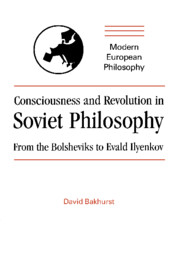Crossref Citations
This Book has been
cited by the following publications. This list is generated based on data provided by Crossref.
Bakhurst, David
1991.
Political emancipation and the domination of nature: The rise and fall of Soviet Prometheanism.
International Studies in the Philosophy of Science,
Vol. 5,
Issue. 3,
p.
215.
Larvor, Brendan
1992.
Re-reading Soviet philosophy: Bakhurst on Ilyenkov.
Studies in Soviet Thought,
Vol. 44,
Issue. 1,
p.
1.
Carroll, William K.
and
Ratner, R.S.
1994.
Between Leninism and Radical Pluralism: Gramscian Reflections on Counter-Hegemony and the New Social Movements.
Critical Sociology,
Vol. 20,
Issue. 2,
p.
3.
Bakhurst, David
1995.
On the social constitution of mind: Bruner, Ilyenkov, and the defence of cultural psychology.
Mind, Culture, and Activity,
Vol. 2,
Issue. 3,
p.
158.
Davydov, Vasily V
and
Kerr, Stephen T
1995.
The Influence of L. S. Vygotsky on Education Theory, Research, and Practice.
Educational Researcher,
Vol. 24,
Issue. 3,
p.
12.
Bakhurst, David
1995.
Lessons from Ilyenkov.
The Communication Review,
Vol. 1,
Issue. 2,
p.
155.
Kaptelinin, Victor
Kuutti, Kari
and
Bannon, Liam
1995.
Human-Computer Interaction.
Vol. 1015,
Issue. ,
p.
189.
Bakhurst, David
1997.
The Philosophy of Activity.
Russian Studies in Philosophy,
Vol. 36,
Issue. 1,
p.
47.
Blanton, William E.
Moorman, Gary
and
Trathen, Woodrow
1998.
Chapter 7: Telecommunications and Teacher Education: A Social Constructivist Review.
Review of Research in Education,
Vol. 23,
Issue. 1,
p.
235.
Jones, Peter E.
1999.
The embodied mind: Contrasting visions.
Mind, Culture, and Activity,
Vol. 6,
Issue. 4,
p.
274.
Miettinen, Reijo
1999.
The riddle of things: Activity theory and actor‐network theory as approaches to studying innovations.
Mind, Culture, and Activity,
Vol. 6,
Issue. 3,
p.
170.
Prawat, Richard S.
1999.
Social constructivism and the process‐content distinction as viewed by Vygotsky and the pragmatists.
Mind, Culture, and Activity,
Vol. 6,
Issue. 4,
p.
255.
Rose, Mike
1999.
“Our Hands Will Know”: The Development of Tactile Diagnostic Skill—Teaching, Learning, and Situated Cognition in a Physical Therapy Program.
Anthropology & Education Quarterly,
Vol. 30,
Issue. 2,
p.
133.
Prawat, Richard S.
2000.
Dewey Meets the “Mozart of Psychology” in Moscow: The Untold Story.
American Educational Research Journal,
Vol. 37,
Issue. 3,
p.
663.
Dickens, Peter
2001.
Changing Nature, Changing Ourselves.
Alethia,
Vol. 4,
Issue. 2,
p.
9.
Miettinen, Reijo
2001.
Artifact Mediation in Dewey and in Cultural-Historical Activity Theory.
Mind, Culture, and Activity,
Vol. 8,
Issue. 4,
p.
297.
Bakhurst, David
2001.
Ilyenkov on Aesthetics: Realism, Imagination, and the End of Art.
Mind, Culture, and Activity,
Vol. 8,
Issue. 2,
p.
187.
Lantolf, James P.
2002.
Commentary from the flower garden: responding to Gregg, 2000.
Second Language Research,
Vol. 18,
Issue. 1,
p.
72.
Turner, Phil
and
Turner, Susan
2002.
People and Computers XVI - Memorable Yet Invisible.
p.
89.
Prawat, Richard S.
2002.
Dewey and Vygotsky Viewed Through the Rearview Mirror—and Dimly at That.
Educational Researcher,
Vol. 31,
Issue. 5,
p.
16.



